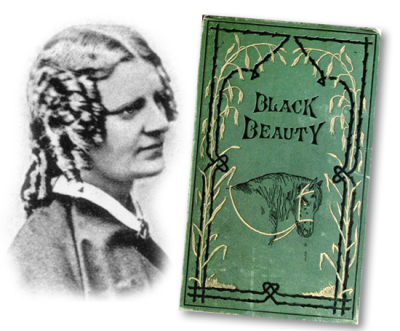
As her birth anniversary approaches, let us delve into the life of the remarkable. Anna Sewell, a British wordsmith whose singular publication Black Beauty is considered to be one of the foremost works in animal welfare literature. Her magnum opus, which is a leading work in children's pony book genre, trotted onto bookshelves just five months prior to her demise in 1877 and has since been the most celebrated animal story that revolutionised the way we treat and interact with animals.
Anna Sewell was born on March 30, 1820, in Yarmouth, England. Her mother, Mary Wright Sewell, was also a writer who specialised in children's stories while her father, Isaac Sewell, worked as a shopkeeper and bank clerk, but struggled to maintain a steady income. The family's financial struggles cast a shadow over Anna's childhood, which was marked by hardship and turmoil.
Tragically, when Anna was just 14 years old, she suffered a serious injury that would have a lasting impact on her life. While walking back from school, she broke her ankle, and the injury was not properly treated, leaving her severely disabled and in poor health for the remainder of her life.
Love for horses
Being reliant on horse-drawn carriages for any excursion beyond her home, she developed an affinity for horses that eventually grew into a deep love for them. As she spent more time around these magnificent creatures, she became increasingly troubled by the widespread mistreatment and neglect they endured at the hands of their owners. Sewell spent her final years as an invalid under the constant care of her mother. Her health had deteriorated to such an extent that she was confined to her bed, with very little mobility. However, it was during this period of confinement that she resolved to write a book that would shed light on the harsh and inhumane treatment of horses that was prevalent during the 19th Century. Her only novel, Black Beauty, was finally published when she was 57 years old, in 1877.
Sadly, Anna Sewell passed away a mere five months after the publication of her book. While the cause of her death remains uncertain, it is widely believed that she succumbed to either hepatitis or phthisis. However, in the few months that she lived after the publication of Black Beauty, she was able to witness the overwhelmingly positive response to her work. Last September, Sewell's home in Yarmouth, Norfolk, was turned into a museum open to the public.
Black Beauty
Animal tales have always captivated our imagination, with their anthropomorphic (having human characteristics) characters and magical worlds. However, it was the publication of Black Beauty in 1877 that brought about a new era of realistic animal storytelling. This novel takes us on a journey through the eyes of a horse living in 19th Century England, narrated in the first-person perspective. Despite the wide range of emotions and thoughts expressed by the horse, the story remains grounded in the animal's true nature, which is both commendable and visionary for its time.
For centuries, horses have been an essential part of society, aiding in various sectors such as agriculture, transportation, construction, and even warfare. Although steam power reduced their workload, horses still played a significant role in English society. Black Beauty revealed the cruelty inflicted upon these animals due to the vanity of the high society and the financial hardships of the working class.
Often considered a children's classic, this book was originally crafted to serve as an autobiography of a horse. Through this story, Sewell intended to raise awareness and promote kindness, sympathy, and humane treatment towards horses. The novel's vivid imagery and simple, lyrical prose facilitates the same. Black Beauty not only broke new ground in animal rights storytelling but also paved the way for more tales featuring horses. However, these works may not have been narrated from the horse's point of view.
Pony book genre
Black Beauty's success led to the rise of the Pony book genre, which gained immense popularity in the last century. These books revolve around the lives of kids and teens who share a love for horses. Such stories are an ode to the incredible bond between humans and horses, which often inspire young readers to develop a passion for equine culture. Today, the role of horses in our lives may have reduced, but the message of Black Beauty and similar works continue to inspire us to treat all living creatures with love, kindness, and respect.
Picture Credit : Google




